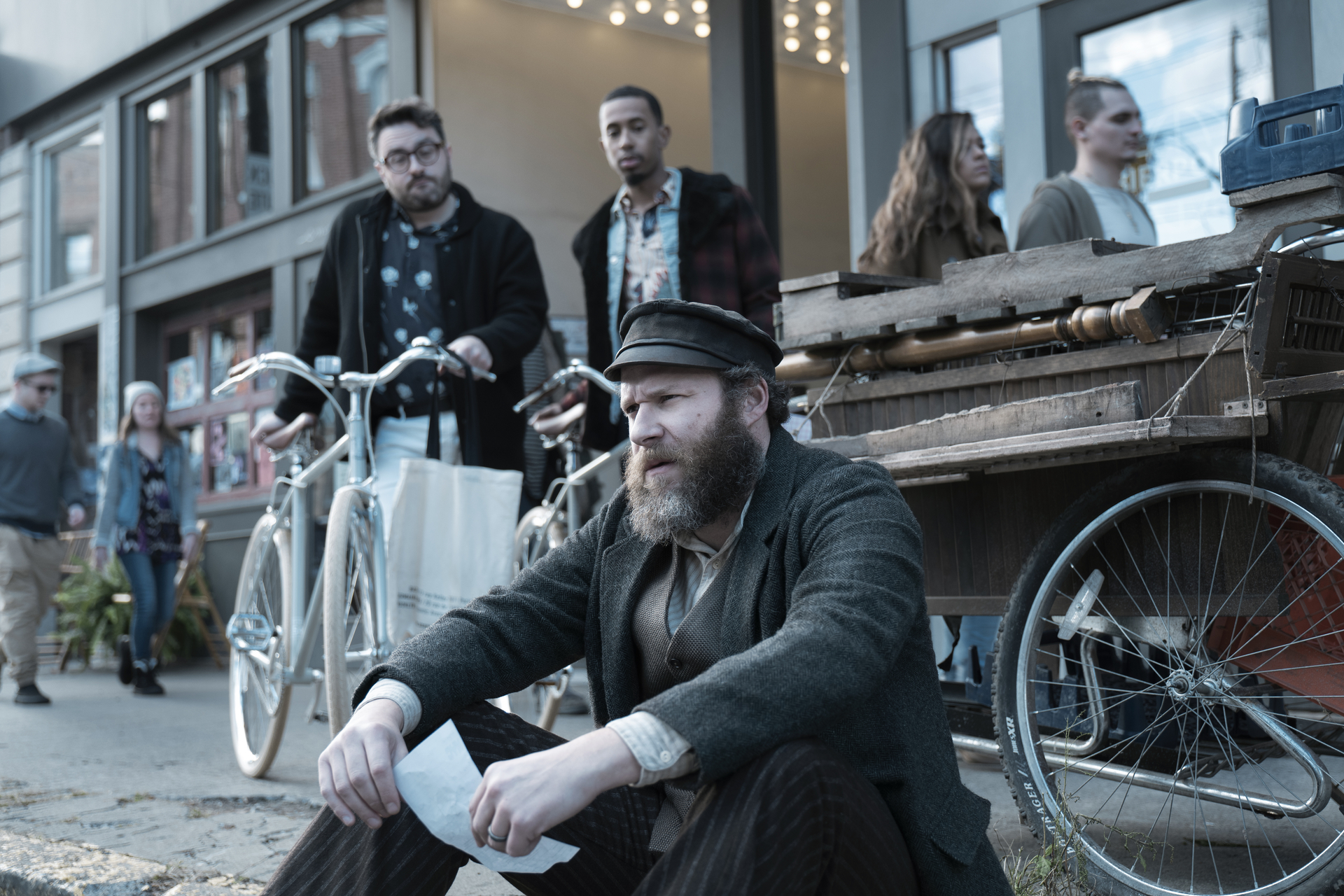
Even as our political landscape has become overloaded with ridiculously wrongheaded declarations, pronouncements so outrageous we can hardly believe our ears, comic absurdity in the movies—dumb, or even smart, stuff that just makes you laugh—feels more precious than ever. We’ve all become worried Victorian orphans facing our glum future. RIP delight; it was nice while it lasted.
But wait! Seth Rogen as an early 20th century pickle-company grunt who falls into a vat of brine and emerges, perfectly preserved, in modern-day Brooklyn? Did someone actually conceive that as a movie idea—let alone get the thing made? The good news for you and for me, my fellow wan Victorian orphans, is that An American Pickle is a real movie, and it’s delightful. Sometimes a logically indefensible premise is the only thing that makes life seem logical.
Rogen plays a dual role here: He is, first, Herschel Greenbaum, a native of the Eastern European region of Schlupsk, a land of mud and hardship. We first meet Herschel in 1919, as he woos a local girl, Sarah (Sarah Schnook). “She has all her teeth, top and bottom,” he notes approvingly. Both have tragic backgrounds, alluded to in dashes of black humor—“Her parents were murdered by Cossacks, my parents were murdered by Cossacks!”—and when yet more violence strikes their village, they set out for America, eager to start a family that will stretch forth through generations.
Then Herschel falls into that vat. He awakens, still wearing his rumpled cap and sporting his scraggly beard, to learn that his beloved wife is long dead; his feelings of displacement stir anger in his heart. Then he learns he has one living relative, a great-grandson, Ben Greenbaum (Rogen again). Ben whisks Herschel to his nerd–bachelor Brooklyn apartment, introducing him to the wonders of Alexa and the miracle of SodaStream (seltzer was an unaffordable luxury in the old country), as well as teaching him the new dance steps, though Herschel has retained some pretty fly “Fiddler on the Roof” moves.
This is the assertively heartwarming part of An American Pickle. But not to worry, it doesn’t last long. Herschel is Ben’s only connection to family: Ben’s father, Herschel’s grandson, has died in a car crash, as has Ben’s mother. But before long, Herschel and Ben—a failed app developer who also, it appears, harbors anger in his heart—have a falling-out. Herschel strikes out on his own and becomes a pickle-cart mogul. Ben, jealous and spiteful, tries to sabotage him. It becomes clear that neither of these guys is particularly nice, and certainly not to each other. Yet their faults unite them, and their stumbling odyssey back toward one another is what gives An American Pickle its spiky warmth.
Directed by Brandon Trost and adapted by Simon Rich from his own novella, “Sell Out,” An American Pickle has an acidic zing that neutralizes any sentimentality. Rogen has a great feel for Yiddish humor, for its lilting rhythms and its joy, but also for its bleakness. (When Herschel learns that Ben has lost his parents, he says, with genuine compassion, “I’m very sorry,” before asking, “Murder, or regular?”) But Rogen can carry the movie’s more serious threads too: while Ben claims that he’s not religious, he comes to understand that even among the non-observant, religion can be the thread that connects families through centuries. Rogen, Trost and Rich have a sense of how ridiculous, and sometimes punishing, life can seem, in 1919 or in 2020. Yet even without the advantage of being preserved in brine, we get through the madness. L’chaim.
More Must-Reads from TIME
- Cybersecurity Experts Are Sounding the Alarm on DOGE
- Meet the 2025 Women of the Year
- The Harsh Truth About Disability Inclusion
- Why Do More Young Adults Have Cancer?
- Colman Domingo Leads With Radical Love
- How to Get Better at Doing Things Alone
- Michelle Zauner Stares Down the Darkness
Contact us at letters@time.com